Mayor of Moscow
The Mayor of the City of Moscow (Russian: Мэр Москвы) is head (governor) of Russian region, the highest official of Moscow, who leads the Government of Moscow, the main executive body of the city.
| Mayor of the City of Moscow | |
|---|---|
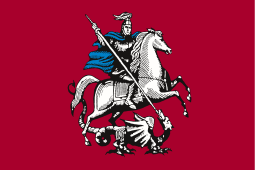 | |
| Style | His Excellency Mr. Mayor |
| Residence | 13 Tverskaya Street, Moscow |
| Seat | Moscow City House |
| Appointer | Popular vote |
| Term length | 5 years |
| Inaugural holder | Gavriil Popov |
| Formation | 12 June 1991 |
| Salary | $ 200,000 |
| Website | Office of the Mayor |
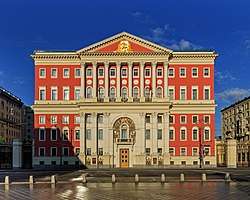
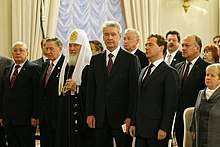
Moscow is both a city and separate federal subject, according to the Constitution of Russia.[1] Most of federal subjects are headed by governors or presidents, but the office of the head of Moscow is called Mayor of the City of Moscow, according to the Charter of the city of Moscow.[2]
Sergey Sobyanin, the incumbent Mayor of Moscow, was re-elected for a new term in 2018.
Responsibilities
The separate office of the Premier of the Government of Moscow existed in 1991-2001 (Yuri Luzhkov was the only officeholder), but it was merged with the office of Mayor of Moscow. 1999 Moscow mayoral election was the last time when the mayor ran together with the vice-mayor.
Mayor of Moscow heads Government of Moscow. The mayor's office administers all city services, public property, police and fire protection, most public agencies, and enforces all city and state laws within Moscow. The mayor's office is located in Tverskaya Street and has jurisdiction over all districts of the City of Moscow. The mayor appoints deputy mayors, directors (heads of city departments) and other officials.
The Government of Moscow's budget is the largest regional budget in Russia.
Elections
The position of Mayor of Moscow was elected between 1991 and 2004. In 2004, Vladimir Putin suggested a law to abolish direct elections of governors, the Moscow mayor, and presidents of Russian regions. The law was swiftly adopted by the parliament.[3] The new legislation moved the election system to an indirect one in which parliamentary political parties and the President of Russia nominated a candidate who must then have been approved by the Moscow City Duma. Following the 2011–13 Russian protests which followed the 2011 parliamentary election, President Dmitry Medvedev offered to re-introduce the direct elections of the governors and the mayor of Moscow, and corresponding legislation was approved by the Parliament.[4] In 2013 for the first time in 10 years mayor was chosen by a popular vote (2013 Moscow mayoral election).
A candidate to the office must be citizen of the Russian Federation over the age of 30. Candidates can be nominated both by political parties and as self-nomination. In any case, candidates must pass the "municipal filter" (collection of signatures of municipal deputies).
Latest election
Sergey Sobyanin was re-elected for a new term in 2018.
Mayors of Moscow (1991–present)
| No. | Portrait | Name | Term of Office | Political Party | |
|---|---|---|---|---|---|
| Took Office | Left Office | ||||
| 1 | .jpg) |
Gavriil Popov | 12 June 1991 | 6 June 1992 | Democratic Russia |
| 2 |  |
Yury Luzhkov | 6 June 1992 | 28 September 2010 | Fatherland – All Russia (prior to 1 December 2001) ↓ United Russia (since 1 December 2001) |
| — |  |
Vladimir Resin Acting Mayor |
28 September 2010 | 21 October 2010 | United Russia |
| 3 | 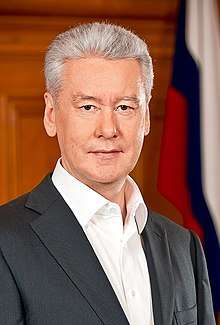 |
Sergey Sobyanin | 21 October 2010 | Incumbent | United Russia |
Previous heads of Moscow
Chairpersons of the Executive Committee (1917–1991)
| No. | Portrait | Name | Term of Office | Political Party | |
|---|---|---|---|---|---|
| Took Office | Left Office | ||||
| 1 |  |
Viktor Nogin | September 1917 | November 1917 | Communist Party |
| 2 | Mikhail Pokrovsky | November 1917 | March 1918 | Communist Party | |
| 3 | 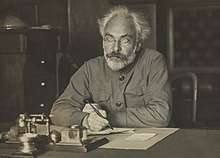 |
Pyotr Smidovich | March 1918 | October 1918 | Communist Party |
| 4 |  |
Lev Kamenev | October 1918 | 16 January 1926 | Communist Party |
| 5 | .svg.png) |
Konstantin Ukhanov | 16 January 1926 | 1931 | Communist Party |
| 6 | 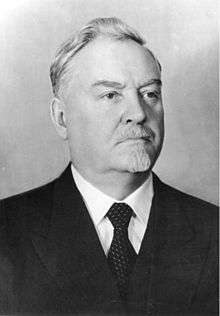 |
Nikolai Bulganin | 1931 | 22 July 1937 | Communist Party |
| 7 | .svg.png) |
Ivan Sidorov | 22 July 1937 | 3 November 1938 | Communist Party |
| 8 | .svg.png) |
Aleksandr Yefremov | 3 November 1938 | 14 April 1939 | Communist Party |
| 9 | .svg.png) |
Vasily Pronin | 14 April 1939 | 7 December 1944 | Communist Party |
| 10 | .svg.png) |
Georgi Popov | 7 December 1944 | 18 January 1950 | Communist Party |
| 11 | .svg.png) |
Mikhail Yasnov | 18 January 1950 | 2 February 1956 | Communist Party |
| 12 | .svg.png) |
Nikolai Bobrovnikov | 2 February 1956 | 1961 | Communist Party |
| 13 | .svg.png) |
Nikolai Dygai | 1961 | 1963 | Communist Party |
| 14 | .jpg) |
Vladimir Promyslov | 1963 | 1986 | Communist Party |
| 15 | .svg.png) |
Valery Saikin | 1986 | 12 June 1991 | Communist Party |
See also
References
- Constitution of the Russian Federation, 65-1
- http://constitution.garant.ru/region/ustav_moskv/chapter/1/#block_5
- Цыбульский, Владимир (January 24, 2013). Синдром отмены (in Russian). Lenta.ru. Retrieved August 21, 2013.
- "Russia's Medvedev Proposes Direct Elections Of Governors".